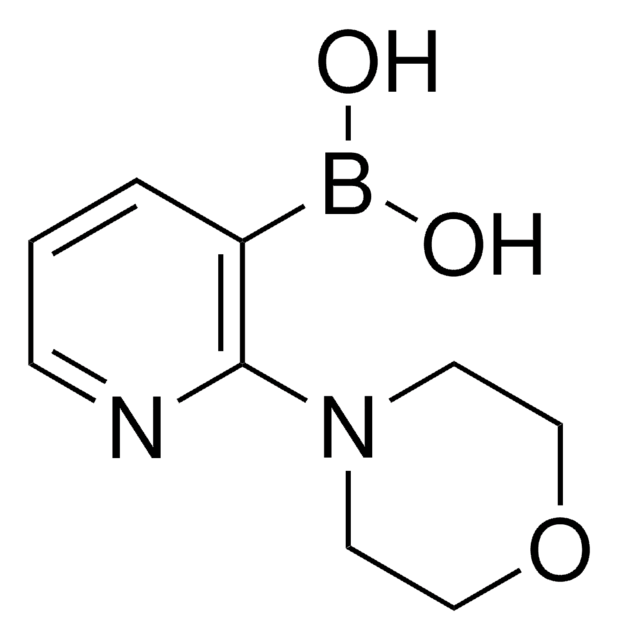All Photos(3)
About This Item
Empirical Formula (Hill Notation):
C8H4Br2S2
CAS Number:
Molecular Weight:
324.06
MDL number:
UNSPSC Code:
12352103
PubChem Substance ID:
NACRES:
NA.23
Recommended Products
Assay
97%
form
powder
mp
97-101 °C
SMILES string
Brc1ccsc1-c2sccc2Br
InChI
1S/C8H4Br2S2/c9-5-1-3-11-7(5)8-6(10)2-4-12-8/h1-4H
InChI key
KBRZCEVRNLKHAZ-UHFFFAOYSA-N
Related Categories
Application
3,3′-Dibromo-2,2′-bithiophene can potentially be used in the designing and synthesis of a variety of optoelectronic and electronic devices, which include organic solar cells, thin film transistors, chemical sensors and photovoltaic cells.
Signal Word
Danger
Hazard Statements
Precautionary Statements
Hazard Classifications
Acute Tox. 3 Oral - Eye Dam. 1
Storage Class Code
6.1C - Combustible acute toxic Cat.3 / toxic compounds or compounds which causing chronic effects
WGK
WGK 3
Flash Point(F)
Not applicable
Flash Point(C)
Not applicable
Choose from one of the most recent versions:
Already Own This Product?
Find documentation for the products that you have recently purchased in the Document Library.
Transistor Paint: Environmentally Stable N-alkyldithienopyrrole and Bithiazole-Based Copolymer Thin-Film Transistors Show Reproducible High Mobilities without Annealing
Liu J, et al.
Advances in Functional Materials, 19(21), 3427-3434 (2009)
Beyond efficiency: scalability of molecular donor materials for organic photovoltaics
Po R and Roncali J
Journal of Material Chemistry C, 4(17), 3677-3685 (2016)
Quaterthiophene-Benzobisazole Copolymers for Photovoltaic Cells: Effect of Heteroatom Placement and Substitution on the Optical and Electronic Properties
Bhuwalka A, et al.
Macromolecules, 44(24), 9611-9617 (2011)
Highly crystalline low-bandgap polymer nanowires towards high-performance thick-film organic solar cells exceeding 10% power conversion efficiency
Lee J, et al.
Energy & Environmental Science, 10(1), 247-257 (2017)
Our team of scientists has experience in all areas of research including Life Science, Material Science, Chemical Synthesis, Chromatography, Analytical and many others.
Contact Technical Service
![Thieno[3,2-b]thiophene 95%](/deepweb/assets/sigmaaldrich/product/structures/353/609/429fd4bf-e217-4371-80a3-9e5a4d88908b/640/429fd4bf-e217-4371-80a3-9e5a4d88908b.png)

![2,6-Dibromodithieno[3,2-b:2′,3′-d]thiophene ≥97%](/deepweb/assets/sigmaaldrich/product/structures/287/437/cf540b93-ec8c-4d2a-897c-dea0a28a8def/640/cf540b93-ec8c-4d2a-897c-dea0a28a8def.png)
![Thieno[3,2-b]thiophene-2,5-dicarboxaldehyde 96%](/deepweb/assets/sigmaaldrich/product/structures/137/771/57dfbc98-f02d-4773-bc11-3e8b861ad74b/640/57dfbc98-f02d-4773-bc11-3e8b861ad74b.png)
![Benzo[1,2-b:4,5-b′]dithiophene-4,8-dione 97%](/deepweb/assets/sigmaaldrich/product/structures/418/544/b7faac0b-ad09-4b42-a9fa-aeb38017a39e/640/b7faac0b-ad09-4b42-a9fa-aeb38017a39e.png)



![2,5-Bis(trimethylstannyl)-thieno[3,2-b]thiophene 97%](/deepweb/assets/sigmaaldrich/product/structures/126/532/26557e94-858e-4c96-90de-ca88d84a8727/640/26557e94-858e-4c96-90de-ca88d84a8727.png)

